36 have author last names that start with P have author last names that start with P

This examination of the office of the German chancellorship as it has evolved under six post-war chancellors analyzes both the nature of executive leadership as institutionalized in the constitutional order or political system and the evolution of the office during the course of individual incumbencies. The distinguished contributors evaluate the "chancellor democracy" model rooted in the imperious incumbency of Konrad Adenauer, which postulates a concentration of executive authority around the chancellorship, and the model of "coordination democracy," which casts the chancellor in a more managerial role in a political system marked by the diffusion of authority. This volume traces a progression from the first model to the second over time.
German unification has thrust new roles on the chancellor, including one as a symbol of unity in an incomplete process of integration, and another as a key figure in redefining Germany's new national and international identity. A number of the contributors address the question of whether the office has the political resources to enable the incumbent to fill these new roles.



Democratic government is about making choices. Sometimes those choices involve the distribution of benefits. At other times they involve the imposition of some type of loss—a program cut, increased taxes, or new regulatory standards. Citizens will resist such impositions if they can, or will try to punish governments at election time. The dynamics of loss imposition are therefore a universal—if unpleasant—element of democratic governance. The Government Taketh Away examines the repercussions of unpopular government decisions in Canada and the United States, the two great democratic nations of North America.
Pal, Weaver, and their contributors compare the capacities of the U.S. presidential system and the Canadian Westminster system to impose different types of losses: symbolic losses (gun control and abortion), geographically concentrated losses (military base closings and nuclear waste disposal), geographically dispersed losses (cuts to pensions and to health care), and losses imposed on business (telecommunications deregulation and tobacco control). Theory holds that Westminster-style systems should, all things being equal, have a comparative advantage in loss imposition because they concentrate power and authority, though this can make it easier to pin blame on politicians too. The empirical findings of the cases in this book paint a more complex picture. Westminster systems do appear to have some robust abilities to impose losses, and US institutions provide more opportunities for loss-avoiders to resist government policy in some sectors. But in most sectors, outcomes in the two countries are strikingly similar.
The Government Taketh Away is essential for the scholar and students of public policy or comparative policy. It is also an important book for the average citizen who wants to know more about the complexities of living in a democratic society where the government can give-but how it can also, sometimes painfully, "taketh away."

In this volume, scholars from philosophy, sociology, history, theology, women’s studies, and law explore the looming ethical and social implications of new biotechnologies that are rapidly making it possible to enhance an individual’s mental and physical attributes in ways previously only imagined.
To clarify the issues, the contributors grapple with the central concept of "enhancement" and probe the uses and abuses of the term. Focusing in particular on the moral issues pertaining to cosmetic surgery and cosmetic psychopharmacology (a category which includes Prozac), they also examine notions of identity, authenticity, normality, and complicity. Other essays in this collection address the social ramifications of the new technologies, including the problems of access and fairness.

As prenatal tests proliferate, the medical and broader communities perceive that such testing is a logical extension of good prenatal care—it helps parents have healthy babies. But prenatal tests have been criticized by the disability rights community, which contends that advances in science should be directed at improving their lives, not preventing them. Used primarily to decide to abort a fetus that would have been born with mental or physical impairments, prenatal tests arguably reinforce discrimination against and misconceptions about people with disabilities.
In these essays, people on both sides of the issue engage in an honest and occasionally painful debate about prenatal testing and selective abortion. The contributors include both people who live with and people who theorize about disabilities, scholars from the social sciences and humanities, medical geneticists, genetic counselors, physicians, and lawyers. Although the essayists don't arrive at a consensus over the disability community's objections to prenatal testing and its consequences, they do offer recommendations for ameliorating some of the problems associated with the practice.
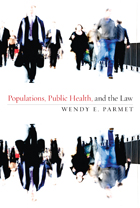
Law plays a crucial role in protecting the health of populations. Whether the public health threat is bioterrorism, pandemic influenza, obesity, or lung cancer, law is an essential tool for addressing the problem. Yet for many decades, courts and lawyers have frequently overlooked law’s critical importance to public health. Populations, Public Health, and the Law seeks to remedy that omission. The book demonstrates why public health protection is a vital objective for the law and presents a new population-based approach to legal analysis that can help law achieve its public health mission while remaining true to its own core values.
By looking at a diverse range of topics, including food safety, death and dying, and pandemic preparedness, Wendy E. Parmet shows how a population-based legal analysis that recalls the importance of populations and uses the tools of public health can enhance legal decision making while protecting both public health and the rights and liberties of individuals and their communities.
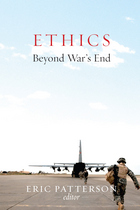
The wars in Afghanistan and Iraq have focused new attention on a perennial problem: how to end wars well. What ethical considerations should guide war’s settlement and its aftermath? In cases of protracted conflicts, recurring war, failed or failing states, or genocide and war crimes, is there a framework for establishing an enduring peace that is pragmatic and moral?
Ethics Beyond War’s End provides answers to these questions from the just war tradition. Just war thinking engages the difficult decisions of going to war and how war is fought. But from this point forward just war theory must also take into account what happens after war ends, and the critical issues that follow: establishing an enduring order, employing political forms of justice, and cultivating collective forms of conciliation. Top thinkers in the field—including Michael Walzer, Jean Bethke Elshtain, James Turner Johnson, and Brian Orend—offer powerful contributions to our understanding of the vital issues associated with late- and post conflict in tough, real-world scenarios that range from the US Civil War to contemporary quagmires in Afghanistan, the Middle East, and the Congo.

As the aspirations of the two rising Asian powers collide, the China-India rivalry is likely to shape twenty-first-century international politics in the region and far beyond.
This volume by T.V. Paul and an international group of leading scholars examines whether the rivalry between the two countries that began in the 1950s will intensify or dissipate in the twenty-first century. The China-India relationship is important to analyze because past experience has shown that when two rising great powers share a border, the relationship is volatile and potentially dangerous. India and China’s relationship faces a number of challenges, including multiple border disputes that periodically flare up, division over the status of Tibet and the Dalai Lama, the strategic challenge to India posed by China's close relationship with Pakistan, the Chinese navy's greater presence in the Indian Ocean, and the two states’ competition for natural resources. Despite these irritants, however, both countries agree on issues such as global financial reforms and climate change and have much to gain from increasing trade and investment, so there are reasons for optimism as well as pessimism.
The contributors to this volume answer the following questions: What explains the peculiar contours of this rivalry? What influence does accelerated globalization, especially increased trade and investment, have on this rivalry? What impact do US-China competition and China’s expanding navy have on this rivalry? Under what conditions will it escalate or end? The China-India Rivalry in the Globalization Era will be of great interest to students, scholars, and policymakers concerned with Indian and Chinese foreign policy and Asian security.

Interpretazioni is an intermediate- to advanced-level Italian textbook that aims to teach language through film, focusing on Italian movies from 2010 to 2017. Teaching language through cinema is a widespread and proven practice that engages all four main language skills (speaking, listening, reading, writing), and Interpretazioni utilizes the proven format and pedagogy of Pausini and Antonello Borra's previous book, Italian Through Film (Yale UP, 2003), which is regarded highly among teachers. Films featured in Interpretazioni span genres, address a wide range of themes, and are set in various parts of Italy, encouraging students and teachers to more fully engage with the complexity of Italian cinema. As in Italian through Film, the activities based on the films are divided into three main categories (before, during, and after viewing the film) with a natural progression from warm-up questions to closed and controlled exercises to open-ended and creative tasks–both oral and written–including grammar practice, all within the context of each single film. An instructor's manual with answer keys and suggestions on using apps for teaching is available on the www.press.georgetown.edu website.

Drawing on multiple interconnected scriptural and spiritual sources, the Jewish tradition of ethical reflection is intricate and nuanced. This book presents scholarly Jewish perspectives on suffering, healing, life, and death, and it compares them with contemporary Christian and secular views.
The Jewish perspectives presented in this book are mainly those of orthodox scholars, with the responses representing primarily Christian-Catholic points of view. Readers unfamiliar with the Jewish tradition will find here a practical introduction to its major voices, from Spinoza to Jewish religious law. The contributors explore such issues as active and passive euthanasia, abortion, assisted reproduction, genetic screening, and health care delivery.
Offering a thoughtful and thought-provoking dialogue between Jewish and Christian scholars, Jewish and Catholic Bioethics is an important contribution to ecumenical understanding in the realm of health care.

Christian health care professionals in our secular and pluralistic society often face uncertainty about the place religious faith holds in today's medical practice. Through an examination of a virtue-based ethics, this book proposes a theological view of medical ethics that helps the Christian physician reconcile faith, reason, and professional duty.
Edmund D. Pellegrino and David C. Thomasma trace the history of virtue in moral thought, and they examine current debate about a virtue ethic's place in contemporary bioethics. Their proposal balances theological ethics, based on the virtues of faith, hope, and charity, with contemporary medical ethics, based on the principles of beneficence, justice, and autonomy. The result is a theory of clinical ethics that centers on the virtue of charity and is manifest in practical moral decisions.
Using Christian bioethical principles, the authors address today's divisive issues in medicine. For health care providers and all those involved in the fields of ethics and religion, this volume shows how faith and reason can combine to create the best possible healing relationship between health care professional and patient.

Exploring the moral foundations of the healing relationship, Edmund D. Pellegrino and David C. Thomasma offer the health care professional a highly readable Christian philosophy of medicine. This book examines the influence religious beliefs have on the kind of person the health professional should be, on the health care policies a society should adopt, and on what constitutes healing in its fullest sense.
Helping and Healing looks at the ways a religious perspective shapes the healing relationship and the ethics of that relationship. Pellegrino and Thomasma seek to clarify the role of religious belief in health care by providing a moral basis for such commitment as well as a balancing role for reason. This book establishes a common ground for believers and skeptics alike in their dedication to relieve suffering by showing that helping and healing require an involvement in the religious values of patients. It clearly argues that religion provides crucial insights into medical practice and morality that cannot be ignored, even in our morally heterogeneous society.
Central to the authors' message is the concept of patients' vulnerabilities and the need to help them recover not only from the disease but also from an existential assault on their personhood. They then show how this understanding can move caregivers to view their professions as vocations and thereby change the nature of health care from a business to a community of healing.
Physicians, nurses, administrators, clergy, theologians, and other health professionals and church leaders will find this volume helpful for their own reflections on the role of religion in the health care ministry and for making a religious commitment integral to their professional lives.

The essays in Ethics, Trust, and the Professions probe the nature of the fiduciary relationship that binds client to lawyer, believer to minister, and patient to doctor. Angles of approach include history, sociology, philosophy, and culture, and their very multiplicity reveals how difficult we find it to formulate a code of ethics which will insure a relationship of trust between the professional and the public.

Cyber weapons and the possibility of cyber conflict—including interference in foreign political campaigns, industrial sabotage, attacks on infrastructure, and combined military campaigns—require policymakers, scholars, and citizens to rethink twenty-first-century warfare. Yet because cyber capabilities are so new and continually developing, there is little agreement about how they will be deployed, how effective they can be, and how they can be managed.
Written by leading scholars, the fourteen case studies in this volume will help policymakers, scholars, and students make sense of contemporary cyber conflict through historical analogies to past military-technological problems. The chapters are divided into three groups. The first—What Are Cyber Weapons Like?—examines the characteristics of cyber capabilities and how their use for intelligence gathering, signaling, and precision striking compares with earlier technologies for such missions. The second section—What Might Cyber Wars Be Like?—explores how lessons from several wars since the early nineteenth century, including the World Wars, could apply—or not—to cyber conflict in the twenty-first century. The final section—What Is Preventing and/or Managing Cyber Conflict Like?—offers lessons from past cases of managing threatening actors and technologies.
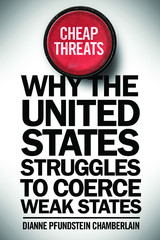
Why do weak states resist threats of force from the United States, especially when history shows that this superpower carries out its ultimatums? Cheap Threats upends conventional notions of power politics and challenges assumptions about the use of compellent military threats in international politics.
Drawing on an original dataset of US compellence from 1945 to 2007 and four in-depth case studies—the Cuban Missile Crisis, the 2011 confrontation with Libya, and the 1991 and 2003 showdowns with Iraq—Dianne Pfundstein Chamberlain finds that US compellent threats often fail because threatening and using force became comparatively “cheap” for the United States after the Cold War. Becoming the world’s only superpower and adopting a new light-footprint model of war, which relied heavily on airpower and now drones, have reduced the political, economic, and human costs that US policymakers face when they go to war. Paradoxically, this lower-cost model of war has cheapened US threats and fails to signal to opponents that the United States is resolved to bear the high costs of a protracted conflict. The result: small states gamble, often unwisely, that the United States will move on to a new target before achieving its goals.
Cheap Threats resets the bar for scholars and planners grappling with questions of state resolve, hegemonic stability, effective coercion, and other issues pertinent in this new era of US warfighting and diplomacy.
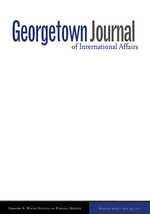
The Georgetown Journal of International Affairs has once again partnered with the Cyber Project at Georgetown University’s Institute for Law, Science, and Global Security to publish the sixth special issue of International Engagement on Cyber. This special issue of the journal seeks to uncover timely topics, broaden dialogue, and advance knowledge within the field of cyber. The articles are written by an international group of leading scholars, practitioners, and policymakers. The Forum of this issue evaluates the US Department of Defense’s 2015 Cyber Strategy and its efficacy in meeting cyber threats. Other topics covered in this issue include applying Just War Theory to the cyber capabilities of non-state actors including ISIS and Anonymous, litigating competing perspectives on the establishment of cyber norms, assessing tensions on the Korean peninsula in the cyber domain, and much more.
The Georgetown Journal of International Affairs is the official publication of the Edmund A. Walsh School of Foreign Service at Georgetown University. The journal was founded to serve as an academic resource for scholars, business leaders, policy makers, and students of international relations, cultivating a dialogue accessible to those with all levels of knowledge about foreign affairs and international politics. Each issue of the journal provides readers with a diverse array of timely, peer-reviewed content that bridges the gap between the work done by news outlets and that done by traditional academic journals.

In this new volume, two lawyers debate which kind of automobile insurance is the best, no-fault or tort liability. This book presents in one place all the legal, political, historical, and financial arguments about the two types of auto insurance.
Under the fault system currently used by thirty-seven states, tort law provides that the party at fault in the accident pays the full damages of accident victims. Jerry J. Phillips favors this system, arguing that it allows for fair compensation to the injured and deters drivers from dangerous behavior on the road.
Stephen Chippendale counters this claim with the argument that tort-law based insurance combines high cost and low benefits, and that those who truly profit from it are the lawyers representing injured clients, while their claims clog up the court system. A better solution, he proposes, would be "Auto Choice," a plan under which consumers would choose whether or not they wished to be eligible for damages from pain and suffering.
With civility and respect, these two legal scholars present thoughtful and thorough arguments on both sides of the debate, giving readers a balanced view of an issue that affects nearly every American. It will be of particular value to those in the fields of law, policy, and insurance.

By combining stories of care, the reflections of caregiving practitioners, and interpretations of caregiving within a larger social and theoretical framework, this collection identifies the values and skills involved in quality caregiving at the individual level and affirms their importance for reshaping our public caregiving institutions. Contributors from the fields of medicine, nursing, teaching, ministry, sociology, psychotherapy, theology, and philosophy articulate their values, hopes, commitments, and practices both in theoretical essays and in narratives of caregiving that reveal the complexities of skillful practice.

Piderit explores the failures of mainstream economics and proposes an alternative grounded in natural law. His assessment is grounded in the Christian higher law tradition which assumes that objective standards known to human reason should govern society and individuals.
This book demonstrates both the reasonableness of a distinguished ethical tradition and its capacity to address a wide range of ethical issues, economic as well as personal and social. Piderit emphasizes that natural law theory underlies the U.S. Constitution and informs Catholic, Protestant, and Jewish worship today.
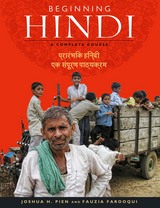
Beginning Hindi is designed to help first-year learners acquire the language by using it in real-life situations. The book and its accompanying audio files–available on the Press website–include clear explanations of language structures, engaging activities, and an organizational format that makes it easy to chart student progress.
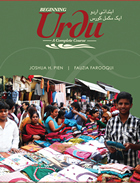
eTextbooks are now available through VitalSource.com!
Beginning Urdu is a complete first-year textbook designed to help learners acquire the language by actively using it in real-life situations. The book and its accompanying audio files–available on the Press website–contain all that is needed to complete one full year of study, including clear explanations of language structures; useful, fun, and engaging activities; and an organizational format that makes it easy to chart student progress.
FEATURES• Develops all four skills—listening, speaking, reading, writing—through a wide range of tasks and activities, including role plays, games, and short conversations• Beautifully illustrated with full-color, authentic images and written in an accessible style• Introduces the sound system and script of Urdu• Organized around functional themes such as home and family, everyday life, the marketplace, personal responsibilities, and travel• Features straightforward grammatical explanations and topically organized vocabulary lists for each of the 34 chapters• Integrates cultural information within the thematic units and also presents culture through aphorisms, poetry, and photographs• Provides an activity set for each unit along with review activities, including tips for increasing fluency and sets of questions to help personalize learning• Contains Urdu–English and English–Urdu glossaries • Includes three appendices—Urdu numbers, additional grammatical structures for moving to advanced levels of proficiency, and a suggested syllabus Beginning Urdu covers approximately 150 contact hours and is designed to bring learners to the ACTFL proficiency level of mid- to high-intermediate in all four skills. The book also serves as a valuable resource for independent learners.

Renowned linguist Kenneth L. Pike and his coauthors offer three previously unpublished essays that apply theoretical linguistic research to the areas of historical linguistics, cross-cultural communications, and text analysis.
"Toward the Historical Reconstruction of Matrix Patterns in Morphology" establishes a comprehensive theory of morphological structure based on a number of languages. "Understanding Misunderstanding as Cross-Cultural Emic Clash" examines the crucial role that language plays in the numerous problems encountered in contacts between people from divergent cultural backgrounds. "The Importance of Purposive Behavior in Text Analysis" explores the centrality of establishing the relationship of reality to what is actually expressed in a text.

Human Rights after Hitler reveals thousands of forgotten US and Allied war crimes prosecutions against Hitler and other Axis war criminals based on a popular movement for justice that stretched from Poland to the Pacific. These cases provide a great foundation for twenty-first-century human rights and accompany the achievements of the Nuremberg trials and postwar conventions. They include indictments of perpetrators of the Holocaust made while the death camps were still operating, which confounds the conventional wisdom that there was no official Allied response to the Holocaust at the time. This history also brings long overdue credit to the United Nations War Crimes Commission (UNWCC), which operated during and after World War II.
From the 1940s until a recent lobbying effort by Plesch and colleagues, the UNWCC’s files were kept out of public view in the UN archives under pressure from the US government. The book answers why the commission and its files were closed and reveals that the lost precedents set by these cases have enormous practical utility for prosecuting war crimes today. They cover US and Allied prosecutions of torture, including “water treatment,” wartime sexual assault, and crimes by foot soldiers who were “just following orders.” Plesch’s book will fascinate anyone with an interest in the history of the Second World War as well as provide ground-breaking revelations for historians and human rights practitioners alike.

Poorman brings together ethics and pastoral practice in an interactional model that captures the distinctive character of Christian pastoral counseling. His work is especially important in a culture that often confuses pastoral counseling with therapy. It also challenges traditional notions which portray the pastoral minister as an instructor who dispenses the church's moral teaching. Poorman distinguishes the pastoral task from that of therapist or teacher, while drawing on the best resources of contemporary psychology and moral development theories. he brings moral theology into lively conversation with pastoral experience; at the same time, his clear presentation brings a critical method of moral discernment to Christian ministry which is rooted in faith and the wisdom of the community.

In this book, Stephen J. Pope argues that contemporary scientifically-based theories of the evolution of altruism provide important insights into one of the fundamental moral problems of Christian ethics, the natural basis of love and its ordering. He explores the contributions evolutionary theory makes to our understanding of the biological foundations of kin preference and reciprocal care, the limits of love, and the need for an ordering of love—issues relevant to any ethic that accords a central role to the deeply natural affections found in friendship, marriage, and the family. He proposes that understanding human nature in its broader evolutionary context brings to ethics a needed balance between the personal and biological dimensions of human nature.
In the context of Catholic ethics, Pope points out functional similarities between Thomas Aquinas's use of then-available scientific theories in his interpretation of the natural basis of primary relationships and Pope's own efforts to avoid the deficiencies that characterize contemporary Catholic interpretations of love based on personalism and existentialism. He concludes with a call for a multidimensional interpretation of love, one that incorporates scientifically-based theories about human nature together with an appreciation of the significance of motives, intentions, and freedom, for the ordering of human affections and moral responsibility. This book will be of interest to moral theologians, especially those concerned with the topics of love, justice, and natural law ethics.

The sexual abuse scandal in the Catholic Church has been exacerbated in the minds of many by the dismal response of church leadership. Uncovered along with the abuse of power were decisions that were not only made in secrecy, but which also magnified the powerlessness of the people of the church to have any say in its governance. Accordingly, many have left the church, many have withheld funding—others have vowed to work for change, as witnessed by the phenomenal growth of Voice of the Faithful. Common Calling is indeed a call—for change, for inclusion, and a place at the table for the laity when it comes to the governance of the church.
By first providing compelling historical precedents of the roles and status of the laity as it functioned during the first millennium, Common Calling compares and contrasts those to the place of the laity today. It is this crossroad—between the past and the possible future of the Catholic Church—where the distinguished contributors to this volume gather in the hope and expectation of change. They examine the distinction between laity and clergy in regard to the power of church governance, and explore the theological interpretation of clergy-laity relations and governance in the teachings of the Second Vatican Council. They look at how church officials interpret the role of the laity today and address the weaknesses in that model. Finally, they speak clearly in outlining the ways governance may be improved, and how—by emphasizing dialogue, participation, gender equality, and loyalty—the role of the laity can be enhanced.
Speaking as active believers and academic specialists, all of the contributors assert that the church must evolve in the 21st century. They represent a variety of disciplines, including systematic theology, sacramental theology, canon law, political science, moral theology, pastoral theology, and management. The book also includes an essay by James Post, cofounder of the Catholic lay movement Voice of the Faithful, the organization that was in part responsible for the resignation of Boston's Cardinal Bernard Law. Common Calling looks to a future of transparency in the Catholic Church that, with an invested laity, will help to prevent any further abuse—especially the abuse of power.

In this comprehensive anthology, twenty-seven outstanding scholars from North America and Europe address every major aspect of Thomas Aquinas's understanding of morality and comment on his remarkable legacy. While there has been a revival of interest in recent years in the ethics of St. Thomas, no single work has yet fully examined the basic moral arguments and content of Aquinas' major moral work, the Second Part of the Summa Theologiae. This work fills that lacuna.
The first chapters of The Ethics of Aquinas introduce readers to the sources, methods, and major themes of Aquinas's ethics. The second part of the book provides an extended discussion of ideas in the Second Part of the Summa Theologiae, in which contributors present cogent interpretations of the structure, major arguments, and themes of each of the treatises. The third and final part examines aspects of Thomistic ethics in the twentieth century and beyond.
These essays reflect a diverse group of scholars representing a variety of intellectual perspectives. Contributors span numerous fields of study, including intellectual history, medieval studies, moral philosophy, religious ethics, and moral theology. This remarkable variety underscores how interpretations of Thomas's ethics continue to develop and evolve—and stimulate fervent discussion within the academy and the church.
This volume is aimed at scholars, students, clergy, and all those who continue to find Aquinas a rich source of moral insight.

The medical tradition that developed in the lands of Islam during the medieval period (c. 650-1500) has, like few others, influenced the fates and fortunes of countless human beings. It is a story of contact and cultural exchange across countries and creeds, affecting many people from kings to the common crowd. This tradition formed the roots from which modern Western medicine arose. Contrary to the stereotypical picture, medieval Islamic medicine was not simply a conduit for Greek ideas, but a venue for innovation and change.
Medieval Islamic Medicine is organized around five topics: the emergence of medieval Islamic medicine and its intense crosspollination with other cultures; the theoretical medical framework; the function of physicians within the larger society; medical care as seen through preserved case histories; and the role of magic and devout religious invocations in scholarly as well as everyday medicine. A concluding chapter on the "afterlife" concerns the impact of this tradition on modern European medical practices, and its continued practice today. The book includes an index of persons and their books; a timeline of developments in East and West; and a section on further reading.
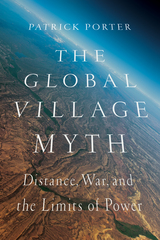
According to security elites, revolutions in information, transport, and weapons technologies have shrunk the world, leaving the United States and its allies more vulnerable than ever to violent threats like terrorism or cyberwar. As a result, they practice responses driven by fear: theories of falling dominoes, hysteria in place of sober debate, and an embrace of preemptive war to tame a chaotic world.
Patrick Porter challenges these ideas. In The Global Village Myth, he disputes globalism's claims and the outcomes that so often waste blood and treasure in the pursuit of an unattainable "total" security. Porter reexamines the notion of the endangered global village by examining Al-Qaeda's global guerilla movement, military tensions in the Taiwan Strait, and drones and cyberwar, two technologies often used by globalists to support their views. His critique exposes the folly of disastrous wars and the loss of civil liberties resulting from the globalist enterprise. Showing that technology expands rather than shrinks strategic space, Porter offers an alternative outlook to lead policymakers toward more sensible responses—and a wiser, more sustainable grand strategy.

This book is the first comprehensive analysis of the politics behind the use of mandates requiring state and local governments to implement federal policy.
Over the last twenty-five years, during both liberal and conservative eras, federal mandates have emerged as a resilient tool for advancing the interests of both political parties. Revealing the politics that led to the policies, Paul L. Posner explores the origins of these congressional mandates, what interests and needs they satisfy, whether mandate reform initiatives can be expected to alter their use, and their implications for federalism.
This book reveals how mandates have changed the way policy is formed in the United States and the fundamental relationship between the federal government and the state and local governments.

The biological revolution, with its attendant technological powers to alter nature and human nature, demands fundamental and cautionary reflection on questions of the highest ethical importance. In this thoughtful book on contemporary issues in bioethics, Stephen G. Post explores nine major topics ranging from birth and adolescence to aging and death. Using an interdisciplinary approach, Post clearly illuminates the issues, probes the ethical alternatives, and examines the cultural changes that shape current presuppositions about the right and good. This book will be of interest to scholars in bioethics, philosophy, and religious studies; health-care professionals; and the general reader concerned with these pressing questions of life and death.

As early as the sixteenth century the liberal democratic state has been forced to confront the question of religion in politics. The result has been a tense and uncomfortable balancing act. Today, in the public square of liberal democracy, a number of religious confessions and beliefs compete for attention. In the American experience, some sense of religious pluralism and relative social harmony has been maintained. However, for this relationship to prevail, a tension must continue to exist—one that balances the political and social pursuits of self-interest with meeting the objectives of the common good.
In Reaping the Whirlwind, John R. Pottenger shows how this process began in the modern world, and how societies attempt to manage this ongoing conflict. The first part of the book lays the groundwork of his analysis by using examples from history to demonstrate the genesis of political and religious "whirlwinds." It goes on to explore contemporary case studies, such as conflicts between Mormons and Evangelicals in the United States, liberation theology in Latin America, Islam and the state in Uzbekistan, and radical Christian reconstructionism.
Pottenger believes that the formal institutions of liberal democracy should maintain this turbulence, even as religious activism threatens to upset the balance. He concludes by advocating religious liberty and recognizing the individual and social need for expression. At the same time, he maintains that the survival of liberal democracy requires that these religious traditions not dominate the public sphere.

Sarah B. Pralle takes an in-depth look at why some environmental conflicts expand to attract a lot of attention and participation, while others generate little interest or action. Branching Out, Digging In examines the expansion and containment of political conflict around forest policies in the United States and Canada.
Late in 1993 citizens from around the world mobilized on behalf of saving old-growth forests in Clayoquot Sound. Yet, at the same time only a very few took note of an even larger reserve of public land at risk in northern California. Both cases, the Clayoquot Sound controversy in British Columbia and the Quincy Library Group case in the Sierra Nevada mountains of northern California, centered around conflicts between environmentalists seeking to preserve old-growth forests and timber companies fighting to preserve their logging privileges. Both marked important episodes in the history of forest politics in their respective countries but with dramatically different results. The Clayoquot Sound controversy spawned the largest civil disobedience in Canadian history; international demonstrations in Japan, England, Germany, Austria, and the United States; and the most significant changes in British Columbia's forest policy in decades. On the other hand, the California case, with four times as many acres at stake, became the poster child for the "collaborative conservation" approach, using stakeholder collaboration and negotiation to achieve a compromise that ultimately broke down and ended up in the courts.
Pralle analyzes how the various political actors—local and national environmental organizations, local residents, timber companies, and different levels of government—defined the issues in both words and images, created and reconfigured alliances, and drew in different governmental institutions to attempt to achieve their goals. She develops a dynamic new model of conflict management by advocacy groups that puts a premium on nimble timing, flexibility, targeting, and tactics to gain the advantage and shows that how political actors go about exploiting these opportunities and overcoming constraints is a critical part of the policy process.

Once a keystone of the Democratic Party, American Catholics are today helping to put Republicans in office. This book traces changes in party allegiance and voting behavior of Catholics in national elections over the course of 150 years and explains why much of the voting bloc that supported John F. Kennedy has deserted the Democratic coalition.
William B. Prendergast analyzes the relationship between Catholics and the GOP from the 1840s to 1990s. He documents a developing attachment of Catholics to Republican candidates beginning early in this century and shows that, before Kennedy, Catholics helped elect Eisenhower, returned to the polls in support of Nixon and Reagan, and voted for a Republican Congress in 1994.
To account for this shifting allegiance, Prendergast analyzes transformations in the Catholic population, the parties, and the political environment. He attributes these changes to the Americanization of immigrants, the socioeconomic and educational advancement of Catholics, and the emergence of new issues. He also cites the growth of ecumenicism, the influence of Vatican II, the abatement of Catholic-Protestant hostility, and the decline of anti-Catholicism in the Republican party.
Clearly demonstrating a Catholic move toward political independence, Prendergast's work reveals both the realignment of voters and the influence of religious beliefs in the political arena. Provocative and informative, it confirms the opinion of pollsters that no candidate can take the vote of the largest and most diverse religious group in the nation for granted.

Do people of differing ethnicities, cultures, and races view medicine and bioethics differently? And, if they do, should they? Are doctors and researchers taking environmental perspectives into account when dealing with patients? If so, is it done effectively and properly?
In African American Bioethics, Lawrence J. Prograis Jr. and Edmund D. Pellegrino bring together medical practitioners, researchers, and theorists to assess one fundamental question: Is there a distinctive African American bioethics?
The book's contributors resoundingly answer yes—yet their responses vary. They discuss the continuing African American experience with bioethics in the context of religion and tradition, work, health, and U.S. society at large—finding enough commonality to craft a deep and compelling case for locating a black bioethical framework within the broader practice, yet recognizing profound nuances within that framework.
As a more recent addition to the study of bioethics, cultural considerations have been playing catch-up for nearly two decades. African American Bioethics does much to advance the field by exploring how medicine and ethics accommodate differing cultural and racial norms, suggesting profound implications for growing minority groups in the United States.
READERS
Browse our collection.
PUBLISHERS
See BiblioVault's publisher services.
STUDENT SERVICES
Files for college accessibility offices.
UChicago Accessibility Resources
home | accessibility | search | about | contact us
BiblioVault ® 2001 - 2024
The University of Chicago Press









